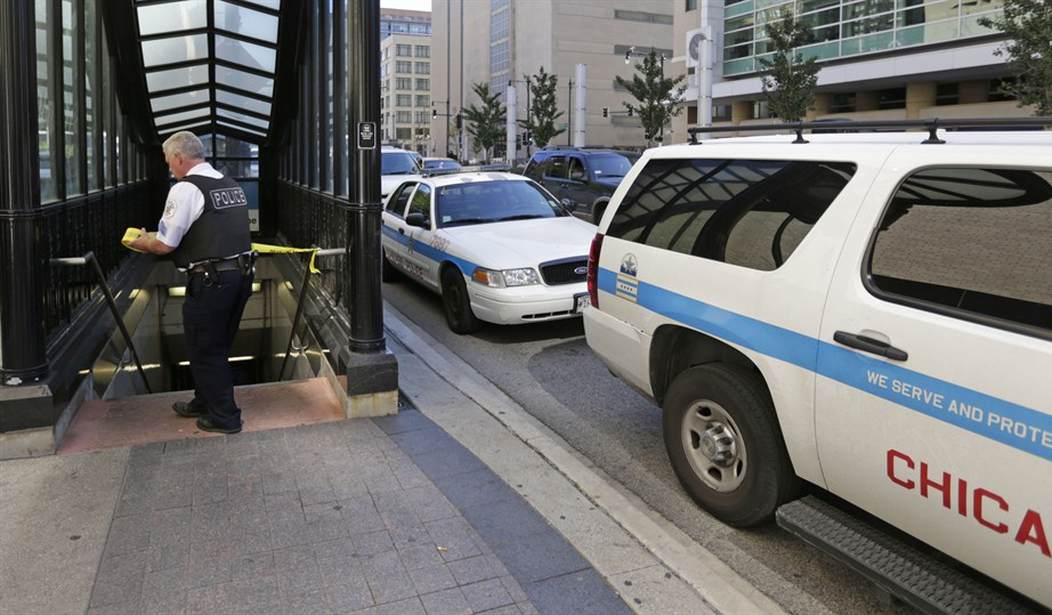Last week, Bethany MaGee, 26, did what countless other women in Chicago do: she got on the CTA's Blue Line to travel across the city. Unfortunately, so did Lawrence Reed, a 50-year-old career criminal with at least 72 prior arrests. Initial reports said Reed was arrested 22 times, then 49 times. Regardless, he should not have been free to roam the streets of Chicago, and now an innocent woman is in the hospital fighting for her life.
In August, Reed was arrested after he assaulted a social worker at a psychiatric hospital. Prosecutors said he caused the woman "great bodily harm" and that she suffered from "extreme nausea, severe pain in the eye and head, and difficulty with balance" — symptoms that landed her in the ER twice. That woman now was later diagnosed with "optic nerve bruising and a concussion," both of which cause her "experience memory issues, headaches, and daily nausea."
Prosecutors urged Judge Teresa Molina-Gonzalez to keep Reed behind bars. Instead, she set him loose with ankle monitoring. In September, another judge loosened Reed's restrictions.
Now we have learned that shortly before turning Reed loose on innocent Chicagoans, Judge Gonzalez told prosecutors she simply can't keep all these criminals behind bars.
“I can’t keep everybody in jail because the State’s Attorney wants me to.”
— CWBChicago (@CWBChicago) November 21, 2025
Those are the words uttered by the judge moments before she released the man now accused of setting a woman on fire aboard a Blue Line train.https://t.co/g568xELTo5
“I can’t keep everybody in jail because the State’s Attorney wants me to.”
Those 13 words may linger in the mind of Cook County Judge Teresa Molina-Gonzalez for a long, long time. Because that’s what she told a Cook County assistant state’s attorney on August 22 when the prosecutor objected to the judge releasing Lawrence Reed, the man accused of setting a woman on fire aboard a Blue Line train this week, on an ankle monitor, a court transcript shows.She released Reed on the ankle monitor after a prosecutor, hauntingly, in retrospect, warned that electronic monitoring “could not protect the victim or the community from another vicious, random, and spontaneous attack.”
In the minutes before Molina-Gonzalez rejected the state’s detention petition for Reed, Assistant State’s Attorney Jerrilyn Gumila told the judge that the 50-year-old Reed had knocked a social worker unconscious inside the locked psychiatric wing of MacNeal Hospital in the west suburbs.
Recommended
But there's even more to this story. It turns out Judge Gonzalez not only bragged about being a DEI hire herself, but that she often bases her rulings on the color of peoples' skin.
Judge Teresa Molina-Gonzalez (D) who let Lawrence Reed out before he lit a woman on fire despite prosecutors begging to keep him detained and 72 prior arrests, basically admits she’s a DEI hire and rules based on how people look pic.twitter.com/eIKOjptiOj
— Libs of TikTok (@libsoftiktok) November 23, 2025
"The first time I came out on the bench and the deputy announced, 'All rise, the Honorable Judge Teresa Molina,' the whole courtroom stood up...and I saw an Illinois state trooper, he was African American...and he looked at me, and he nodded. And I knew what that meant, and so I looked at him, and I nodded back. Like, 'That's right, we're doing this.' And it felt so good," she said.
The video showed several other remarks Gonzalez said at this meeting.
"To me, a fine of $354, which is our normal no-insurance fine, that's a lot of money. And, some of the judges that I work with came from money, so $354 is no big deal," Gonzalez said. "But to most of the people that come to my courtroom, it is a big deal, and so I always offer them the opportunity to do community service."
Of course, the financial fallout that comes from having an accident with an uninsured driver costs far more than $354. And it's state law that Illinois drivers have insurance. We thought no one was above the law, but apparently, in Judge Gonzalez's courtroom, some are.
"You know, being a Latina in the office, people would tell me, 'Don't you feel like you're prosecuting your own people?' But, it's true there are a lot of defendants that look like me. However, I had a chance as a prosecutor to make a difference as to what cases come in. I had a chance as a prosecutor to decide what offers were appropriate," Gonzalez said.
The implications, of course, are clear: she rules on cases based on the race of the defendants.
We thought justice was supposed to be blind.
























Join the conversation as a VIP Member